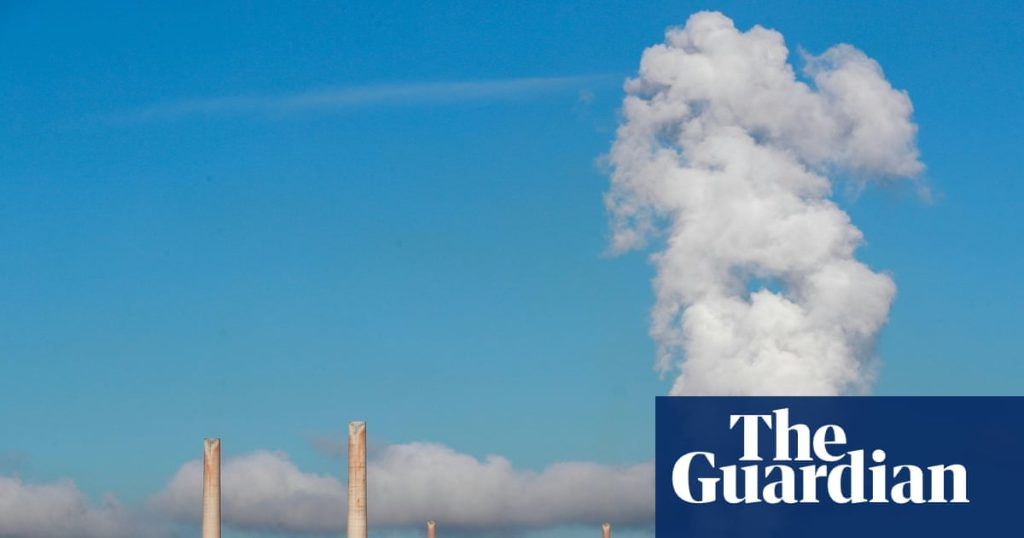What do you think would happen if you decided that because the amount of tax you owe the government was only a barely perceptible percentage of overall tax revenue, you weren’t going to bother paying?
Aside from the ATO laughing at you before sending you a bill, your friends would probably call you a freeloader, telling you everyone has to do their bit.
This brings us (no honestly, it does) to the way some Coalition members have been arguing about the climate crisis in recent weeks, and whether Australia should bother to get its greenhouse gas emissions down to net zero.
The Liberal party’s backing of a net zero climate target is under review, but frontbench MP Andrew Hastie has joined other Coalition figures, including Nationals Barnaby Joyce and Matt Canavan, in calling for Australia to abandon the target.
Sign up: AU Breaking News email
When making these arguments, conservatives have been saying Australia’s emissions are only a small percentage of the global total.
The conclusion they want Australians to reach is clear – if our country’s emissions are so small, why bother?
“Net zero is devastating for our economy and will have absolutely zero effect on the climate,” said Joyce this week. “It has no effect on the climate whatsoever.”
Hastie has pointed to China’s outsized emissions, alongside the United States and India, contrasting it with Australia’s “1.1%” of global emissions.
“It’s been called the drop in the bucket argument,” says Prof Brendan Mackey, the director of the Griffith Climate Action Beacon at Griffith University.
“But the argument is deeply flawed for a number of reasons.”
‘Deeply flawed’
It is true that Australia’s emissions are only about 1.1% of the global total, according to data maintained by the European Commission. China’s emissions are 29.2%.
But what if you extend this “drop in the bucket” argument to all the countries whose global contribution to greenhouse gas emissions are smaller than Australia’s?
That would be more than 190 countries and territories that suddenly stop trying to cut their emissions. Should they all be able to abandon their climate targets too, and what would be the effect of that?
If you create a group with Australia at the top and include every country with emissions lower than ours, then all those countries contribute 28.4% of global emissions.
“To limit global warming to any level, we have to get to net zero. All emissions actually count,” says Mackey.
“Every increment of global warming brings more loss and damage from climate impacts, so all emissions do count.
“It is scientifically wrong to say that half a billion tonnes (roughly Australia’s annual emissions) of CO2 don’t matter. They materially do.”
Plus, while Australia’s gross emissions are relatively small, the country’s per capita emissions are among the highest on the planet and almost double China’s.
International agreements
When conservatives argue Australia’s emissions don’t matter because they’re only 1% of global emissions, what they rarely say is what that means for international climate agreements that Australia has signed up to.
Under the Paris climate agreement, countries must come up with their own pledges – known as a National Determined Contribution – that collectively meet a global goal of keeping global heating “well below 2C” and aim for 1.5C.
Right now, those pledges will probably lead to global heating of about 2.7C. But the agreement asks countries to continually improve their targets every five years.
“Everyone makes an NDC, no matter how big or small. It needs collaboration from all countries. If you don’t make an NDC and if it doesn’t increase in ambition then you are basically withdrawing from the Paris agreement,” said Mackey.
“Because Australia is so exposed to climate hazards, it is in our interests to make sure the Paris agreement works and global warming is capped.”
Roanna McClelland, a research fellow at Melbourne Law School’s Laureate Program on Global Corporate Climate Accountability, said a recent legal opinion by the International Court of Justice had heightened the legal obligations of countries, including Australia, to limit emissions under UN climate agreements.
“Regardless of the views about Australia’s individual contribution [to global emissions] we are party to the international Paris agreement with a commitment to meet the 1.5C target, which the ICJ has now affirmed as a legal standard.”
In other words, Australia has signed up to a collective effort on global warming. If conservatives want Australia to step away from that, they should (like Canavan has) just say so.
Not so, Hastie
In an interview on Sky News this week, Joyce rattled off a list of countries and regions who he claimed were “not in” on global efforts to cut emissions.
“India’s not in, Indonesia’s not in, South America, Africa, south-east Asia, none of them are in,” claimed Joyce.
All those countries – and the countries that make up those regions – have all made pledges under the Paris agreement.
In one radio interview, Hastie claimed emissions were going up in China, India, South Korea, the US and Japan.
Emissions are rising in China and India, but China has said it wants to see its emissions peak before 2030 and reach net zero by 2060. India wants to reach net zero by 2070.
Japan’s emissions have been falling since 2013 and South Korea’s have been falling since 2018.
In the US, emissions have also been falling in recent years, although a second term of Donald Trump – who has called climate change a “hoax” – could change all that.

